Netanyahu Sworn In Pledging To Stop Iran's Nuclear Program
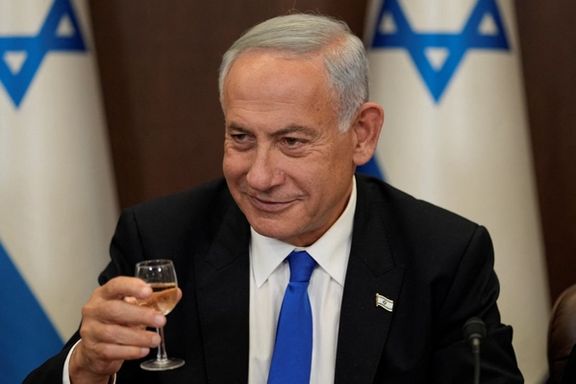
Benjamin Netanyahu was sworn in as Israel's prime minister with a hard-right cabinet promising to thwart Iran's nuclear program and beefing up Israel's military.

Benjamin Netanyahu was sworn in as Israel's prime minister with a hard-right cabinet promising to thwart Iran's nuclear program and beefing up Israel's military.
Israel’s parliament, or Knesset, passed a vote of confidence in his new government Thursday with 63 voted in favor and 54 votes against.
Outgoing Yair Lapid, who was in the Prime Minister's office for only half a year, said during the swearing -in session that his joint government with Bennett thwarted US President Joe Biden's efforts to revive the 2015 Iranian nuclear deal.
“Contrary to all the rageful predictions and prophecies, our government managed to stop the signing of a revived nuclear agreement with Iran,” Lapid said.
"The Revolutionary Guards were not removed from the list of terrorist organizations and the International Atomic Energy Agency did not close its investigatory files on Iran," he added.
In his parliamentary speeches beforethe swearing in on Thursday, the 73-year-old Netanyahu said his three big missions are stopping Iran’s nuclear program, developing state infrastructure, and restoring internal security and governance to Israel.
Earlier, in an interview with Al-Arabiya Netanyahu reiterated his long-standing opposition to the 2015 Iran nuclear deal and urged Saudi Arabia to ‘normalize’ with Israel.
He called the JCPOA, signed by world powers in 2015, a “horrible agreement because it allowed Iran basically with international approval, to develop a nuclear and basically an atomic arsenal paved with gold, with hundreds of billions of dollars of sanction relief.”
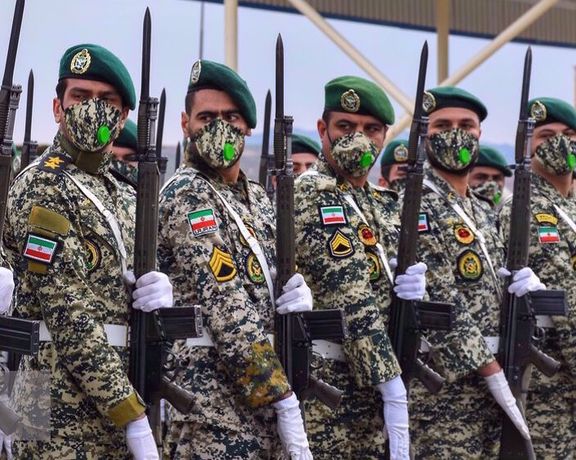
The military hierarchy of the Islamic Republic has once again threatened the United States and Israel saying it will “firmly” respond to any attack.
The General Staff of the Armed Forces issued a statement on Wednesday claiming the “enemies” hatched different military, economic, and political plots against the Islamic Republic over the past four decades.
Using the term “enemies” is a favorite of Supreme Leader Ali Khamenei to refer to the United States, Israel, US allies in the region and in Europe.
The statement further alleged that during the recent demonstrations in Iran “the main strategy was to wage a media and cognitive war to influence young Iranians.”
Following Khamenei’s lead, Iranian officials claim the ongoing antigovernment protests across Iran – ignited by death in custody of 22-year-old Mahsa Amini -- are instigated by foreign enemies.
“The Iranian Armed Forces will not allow the enemies to undermine the security of the people and the country and will continue to closely monitor the sinister moves of the enemies, especially the US and Israel,” reads the statement. The military leadership appointed by Khamenei also renewed their allegiance to him.
Iran’s aging authoritarian ruler Khamenei has always referred to past and current protests as “riots” incited by “enemies” and accused protesters of “sedition”.
The number of protesters killed by security forces since mid-September has now risen to over 500, with tens of thousands injured and arrested.
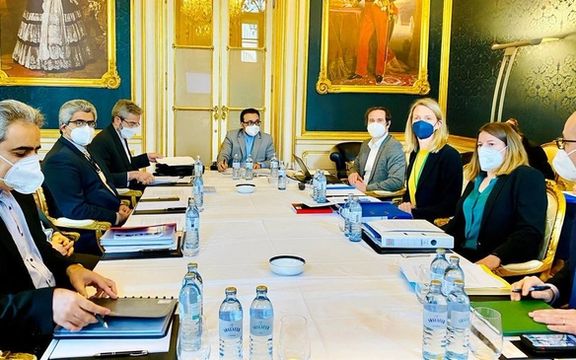
As the Islamic Republic of Iran seems to be searching for a way to resume suspended nuclear talks, Germany, one of the negotiating sides, is opposed at this time.
German Foreign Ministry spokesman Christofer Burger stated Wednesday that Berlin sees no reason to return to the JCPOA negotiations.
“From our point of view, there are currently no indications or reasons for a resumption of the Iran nuclear negotiations,” said Burger, noting that Berlin is focusing on support for Iranian protesters.
He said Germany wants to be on the side of the people who are in the streets fighting for their freedom and dignity and to increase pressure through sanctions on the regime to stop its repression of the people.
US National Security Council Strategic Communications Coordinator John Kirby also told reporters last week that Washington does not “see a deal coming together anytime soon, while Tehran continues to kill its own citizens and sell UAVs to Russia.”
While Germany says there is no reason to resume the JCPOA talks, Iran's Foreign Minister Hossein Amir-Abdollahian announced during his trip to Oman on the same day that Muscat is “seriously making efforts” to mediate to revive the nuclear deal.
The European parties to the Iran nuclear deal and the United States say they were “very close” to reaching an agreement to revive the 2015 deal a few months ago, but Iran failed to cooperate by suddenly presenting “unacceptable” preconditions.
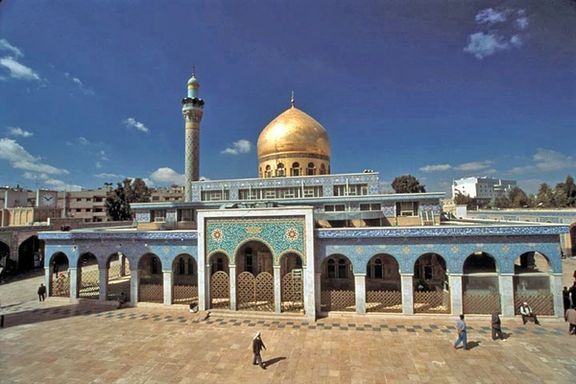
Israel says its ability to strike Iranian nuclear sites has improved and attacks could happen in a few years, while Iran is entrenching near the Syrian capital.
Iran is seeking to revive the expansion of its presence near Damascus, something it has always sought to do but was previously prevented by Russia, a report by Asharq Al-Awsat on Tuesday said, adding that Iran's objective is to create another “southern suburb”, commonly known as Dahieh, like the Hezbollah-dominated suburb of the Lebanese capital Beirut.
The article alleges that the Islamic Republic is scaling up its purchase of homes and establishing new camps in areas adjacent to the zones of influence of Russia, which is currently preoccupied with its war in Ukraine.
The plan is to ultimately expand the influence of Iranian forces in the towns of the southern Damascus countryside adjacent to the Sayyidah Zeinab, a town in the Rif Dimashq Governorate, less than 10 kilometers to Damascus.
The town, locally known as Sitt Zaynab, is the main stronghold of Iranian militias and their proxies in the southern countryside of the capital.
Since late in November, Syria and Iran have been deploying new air defense systems, including jamming and early warning systems, around Damascus to prevent Israeli airstrikes in the area. There are reports that the new systems were built by Korean and Chinese companies and provided by Iran as part of agreements reached between Damascus and Tehran.
On Wednesday, Israel's defense minister said it could attack Iranian nuclear sites in two or three years, in unusually explicit comments about a possible timeline.
With international efforts to renew the 2015 nuclear deal (JCPOA) having stalled, the Iranians have ramped up uranium enrichment, a process that can eventually yield fuel for nuclear bombs -- though they deny having any such design. For more than a decade, Israel has issued veiled threats to attack its arch-enemy's nuclear facilities if it deems world powers' diplomacy with Tehran a dead end. However, some experts doubt Israel has the military clout to deliver lasting damage to Iranian targets that are distant, dispersed and well-defended.

On Tuesday, the chief of staff of the Israeli Defense Forces Lieutenant General Aviv Kochavi said Israel’s level of preparedness for an operation in Iran has dramatically improved.
In a speech at the Israeli Institute for National Security Studies, Kochavi said that the Islamic Republic is seeking to deploy hundreds of missiles in Syria along with deploying "thousands of Shia militiamen." The army chief said Israel managed to disrupt the Iranian vision in Syria "to establish a second Hezbollah in Syria."
Iran claims it is defending the Sayyidah Zeinab shrine, which is visited regularly by thousands of Shiite pilgrims from Iran, Iraq, Lebanon, Afghanistan, and Pakistan. Before the war broke out in Syria about 12 years ago, most of the population of the southeastern countryside of Damascus, including the towns of Babila, Yalda and Beit Sahem were Sunni Muslims.
However, after Damascus regained control of the area in the summer of 2018 and local families started returning to the towns, they were approached by strangers looking to buy their homes and real estate. According to reports, it became clear that those buying the houses were the families of fighters from militias affiliated with the Islamic Republic, originally from the Shiite towns of al-Foua and Kefraya in the Idlib countryside.
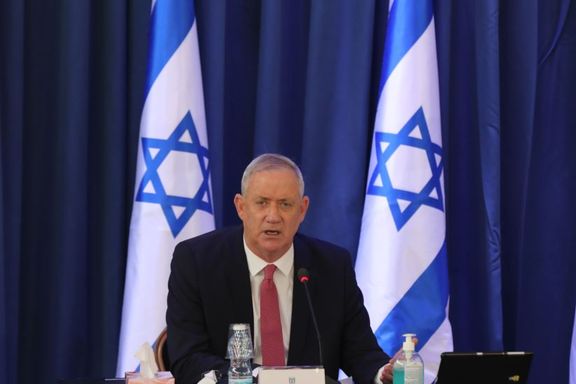
Israel could attack Iranian nuclear sites in two or three years, its defense minister said Wednesday, in unusually explicit comments about a possible timeline.
With international efforts to renew the 2015 nuclear deal (JCPOA) having stalled, the Iranians have ramped up uranium enrichment, a process that can eventually yield fuel for nuclear bombs - though they deny having any such design.
Experts say Iran could potentially raise the fissile purity of its uranium to weapons-grade in short order. But building a deliverable warhead would take it years, they say - an estimate echoed by an Israeli military intelligence general this month.
"In two or three years, you may be traversing the skies eastward and taking part in an attack on nuclear sites in Iran," Defense Minister Benny Gantz told graduating air force cadets in a speech.
For more than a decade, Israel has issued veiled threats to attack its arch-enemy's nuclear facilities if it deems world powers' diplomacy with Tehran a dead end. However, some experts doubt Israel has the military clout to deliver lasting damage to Iranian targets that are distant, dispersed and well-defended.
The Israeli military intelligence forecast for 2023 is that Iran "will continue on its current path of slow progress" in the nuclear realm, according to Israel Hayom newspaper on Sunday.
"Iran will only change its policies if extreme sanctions are imposed on it; then it could decide to accelerate enrichment to military grade," said the report, which a military spokesperson confirmed as citing genuine intelligence assessments.

In January 2022, world powers were in talks aiming to revive the 2015 Iran nuclear deal. The year ends with the powers in dispute at the UN Security Council.
Back in January, there was “no alternative to dialogue,” tweeted German Foreign Minister Annalena Baerbock in Washington. “Political decisions are needed now,” wrote Enrique Mora, the senior European Union official chairing the talks in Vienna aimed at restoring the JCPOA (Joint Comprehensive Plan of Action).
Iranian foreign minister Hossein Amir-Abdollahian agreed the talks were at a point where “we have to make a political decision.” Brett McGurk, a leading US security official, saw a “culmination point…pretty soon.”
But whatever political decisions were – or weren’t – taken, neither the Vienna process, paused in March, nor subsequent indirect US-Iran meetings were enough to bridge gaps, despite continued Iran-US message exchanges until at least September. While Iran reportedly dropped a condition that its Revolutionary Guards be removed from a US list of ‘foreign terrorist organizations,’ it continued to insist on ‘guarantees’ to cushion its economy and nuclear program from the US again leaving the JCPOA.
The Biden administration continued to apply ‘maximum pressure’ sanctions, in November sanctioning 13 companies from mainland China, Hong Kong and the United Arab Emirates, over alleged involvement in selling Iranian petrochemicals in East Asia. Tehran continued expanding its nuclear program beyond JCPOA limits, employing more advanced centrifuges to expand its stockpiles of uranium enriched up to 60 percent.
While the International Atomic Energy Agency (IAEA) reported regularly on Iran’s program, its access remained at a lower level than under the JCPOA. Tehran enforced a law passed by parliament in December 2020 after scientist Mohsen Fakhrizadeh was killed, so reducing agency monitoring roughly to that required under the Nuclear Non-Proliferation Treaty.
October: Involving the Security Council
The JCPOA reached the United Nations Security Council (UNSC) in October as France, the United Kingdom and the US argued Iran and Russia were violating UNSC Resolution 2231, which endorsed the JCPOA in 2015. The three argued that Russia’s use of Iranian military drones violated a clause restricting Iran trading some categories of weapons – an argument Tehran rejected.
This was a shift in the French and UK positions, bring them closer to the US than when in 2021 the E3 – France, Germany and the UK – rejected, on the grounds Washington had left the JCPOA, an US attempt to move UN sanctions against Iran for violating the 2015 agreement.
But this widened the gap with China and Russia. Geng Shuang, Beijing’s deputy permanent representative at the UN, told the UNSC December 19 that as the “the creator of the Iranian nuclear crisis…the US should recognize its responsibility and take the lead in taking practical measures.” Geng said that pressuring Iran would “escalate conflict, undermine trust and cast a shadow over the negotiations.”
Both Russia and China voted against motions in June and November at the 35-nation board of the International Atomic Energy Agency censuring Tehran over an agency enquiry into uranium traces found at undeclared sights, saying the vote would merely make matters worse.
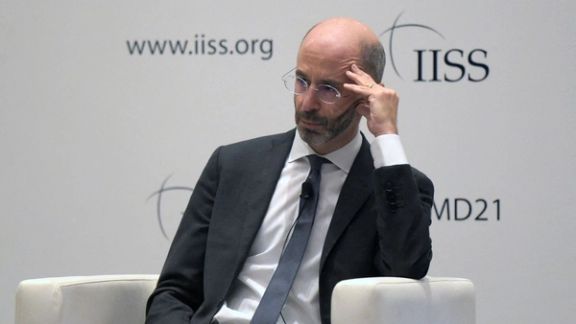
Talks ‘no longer our focus’
By October, US officials, including special envoy Rob Malley, said JCPOA revival was no longer their “focus.” President Joe Biden said Washington was instead “shining a spotlight” on protests in Iran – so rejecting the logic underlying the JCPOA of isolating the nuclear issue. The US, the European Union and the UK all introduced sanctions on Iranian officials over gross violation of human rights during the deadly suppression of protests and over supplying drones to Russia.
Opponents of the JCPOA have ended 2022 in high spirits, nowhere more so than in Israel where Benjamin Netanyahu - whose warning over Iran go back to 1996 when he told the US Congress Tehran was “extremely close” to a nuclear weapons - is preparing to return to power in coalition with three far-right parties.
But some analysts have argued that new thinking is needed to restore momentum for non-proliferation. In November the Washington-based Arms Control Association called for a ‘plan B’ based on “confidence-building steps by the United States and Iran to prevent further escalation...”
In the Washington Post December 1, Ellie Geranmayeh, of the European Council on Foreign Relations, rejected widening sanctions that had led Iran to escalate, arguing for “an active diplomacy track… before it is too late.” She called for “step-by-step measures” to at least freeze Iran’s nuclear program and improve IAEA access in return for “humanitarian economic relief” and eased “sanctions enforcement against third parties trading with Iran, such as those in Iraq, the United Arab Emirates and China.”
But given the prevailing atmosphere amid government violence that has killed 500 protesters and supply of weapons to Russia, tensions with Iran are no longer just over the nuclear issue.